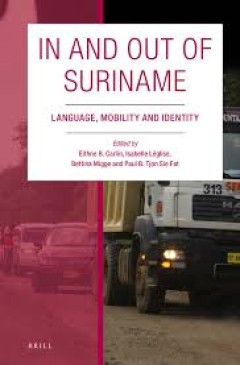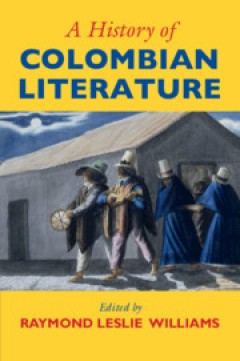Filter by

After the Pink Tide
The left-wing Pink Tide movement that swept across Latin America seems now to be overturned, as a new wave of free-market thinkers emerge across the continent. This book analyses the emergence of corporate power within Latin America and the response of egalitarian movements across the continent trying to break open the constraints of the state. Through an ethnographically grounded and localized…
- Edition
- -
- ISBN/ISSN
- 9781789206586
- Collation
- -
- Series Title
- -
- Call Number
- -

"I'm Not Gonna Die in This Damn Place": Manliness, Identity, and Survival of …
By the time of the Vietnam War era, the “Mexican American Generation” had made tremendous progress both socially and politically. However, the number of Mexican Americans in comparison to the number of white prisoners of war (POWs) illustrated the significant discrimination and inequality the Chicano population faced in both military and civilian landscapes. Chicanos were disproportionately…
- Edition
- -
- ISBN/ISSN
- 9781628953213
- Collation
- -
- Series Title
- -
- Call Number
- -

Knowledge of the Pragmatici : Legal and Moral Theological Literature and the …
Knowledge of the pragmatici sheds new light on pragmatic normative literature (mainly from the religious sphere), a genre crucial for the formation of normative orders in early modern Ibero-America. Long underrated by legal historical scholarship, these media – manuals for confessors, catechisms, and moral theological literature – selected and localised normative knowledge for the colonial …
- Edition
- -
- ISBN/ISSN
- 978-90-04-42573-6
- Collation
- xiv, 382 pp.
- Series Title
- Max Planck Studies in Global Legal History of the Iberian Worlds, Volume: 1
- Call Number
- -

Jesuits in the North American Colonies and the United States : Faith, Conflic…
From Eusebio Kino to Daniel Berrigan, and from colonial New England to contemporary Seattle, Jesuits have built and disrupted institutions in ways that have fundamentally shaped the Catholic Church and American society. As Catherine O’Donnell demonstrates, Jesuits in French, Spanish, and British colonies were both evangelists and agents of empire. John Carroll envisioned an American church in…
- Edition
- -
- ISBN/ISSN
- 978-90-04-43317-5
- Collation
- vi, 112 pp.
- Series Title
- Brill Research Perspectives in Jesuit Studies
- Call Number
- -

Jesuits in Spanish America before the Suppression : Organization and Demograp…
From the late sixteenth century until their expulsion in 1767, members of the Society of Jesus played an important role in the urban life of Spanish America and as administrators of frontier missions. This study examines the organization of the Society of Jesus in Spanish America in large provinces, as well as the different urban institutions such as colegios and frontier missions. It outlines …
- Edition
- -
- ISBN/ISSN
- 978-90-04-46034-8
- Collation
- vi, 108 pp.: 15 color ills., 4 maps, 22 tables
- Series Title
- Brill Research Perspectives in Jesuit Studies
- Call Number
- -

In and Out of Suriname : Language, Mobility and Identity
In and Out of Suriname: Language, Mobility and Identity offers a unique multidisciplinary perspective on a multilingual society in the Caribbean and Guianan sphere. Breaking away from the view of bounded ethnicity, the authors address central theoretical issues of multilingual and multicultural societies including ethnicity as a social distinction, identity as the shifting construction of the s…
- Edition
- -
- ISBN/ISSN
- 978-90-04-28012-0
- Collation
- 304 pp
- Series Title
- Caribbean Series, Volume: 34
- Call Number
- -

A History of Colombian Literature
In recent decades, the international recognition of Nobel Laureate Gabriel García Márquez has placed Colombian writing on the global literary map. A History of Colombian Literature explores the genealogy of Colombian poetry and prose from the colonial period to the present day. Beginning with a comprehensive introduction that charts the development of a national literary tradition, this Histo…
- Edition
- -
- ISBN/ISSN
- 9781139963060
- Collation
- -
- Series Title
- -
- Call Number
- -

A History of American Working-Class Literature
A History of American Working-Class Literature sheds light not only on the lived experience of class but the enormously varied creativity of working-class people throughout the history of what is now the United States. By charting a chronology of working-class experience, as the conditions of work have changed over time, this volume shows how the practice of organizing, economic competition, pl…
- Edition
- -
- ISBN/ISSN
- 9781316216439
- Collation
- -
- Series Title
- -
- Call Number
- -

A History of American Puritan Literature
For generations, scholars have imagined American puritans as religious enthusiasts, fleeing persecution, finding refuge in Massachusetts, and founding 'America'. The puritans have been read as a product of New England and the origin of American exceptionalism. This History challenges the usual understanding of American puritans, offering new ways of reading their history and their literary cult…
- Edition
- -
- ISBN/ISSN
- 9781108878425
- Collation
- -
- Series Title
- -
- Call Number
- -

A History of American Puritan Literature
For generations, scholars have imagined American puritans as religious enthusiasts, fleeing persecution, finding refuge in Massachusetts, and founding 'America'. The puritans have been read as a product of New England and the origin of American exceptionalism. This History challenges the usual understanding of American puritans, offering new ways of reading their history and their literary cult…
- Edition
- -
- ISBN/ISSN
- 9781108878425
- Collation
- -
- Series Title
- -
- Call Number
- -
 Computer Science, Information & General Works
Computer Science, Information & General Works  Philosophy & Psychology
Philosophy & Psychology  Religion
Religion  Social Sciences
Social Sciences  Language
Language  Pure Science
Pure Science  Applied Sciences
Applied Sciences  Art & Recreation
Art & Recreation  Literature
Literature  History & Geography
History & Geography